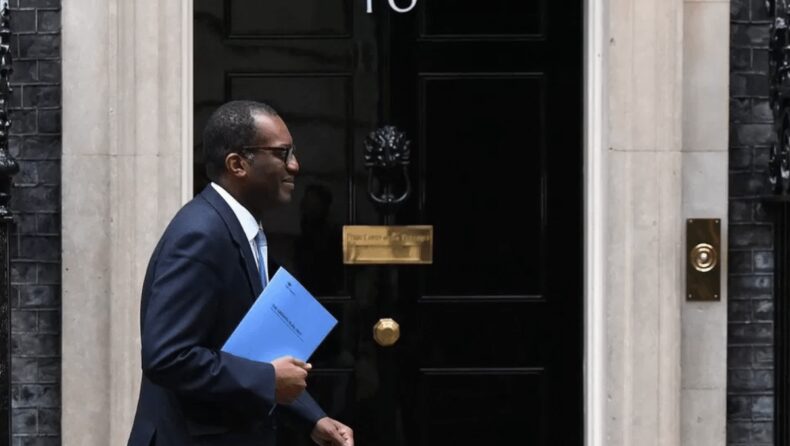The International Monetary Fund has publicly criticized the UK government’s tax cut plans, warning that the measures are likely to exacerbate the cost of living crisis.
In a very candid statement, the IMF said the proposal would likely increase inequality and increase pressure on prices.
The market has already sounded the alarm about the plan and the pound has plunged.
The government said that the measures will boost the growth of the economy.
The pound fell 0.7% to $1.06 on Wednesday morning after the IMF voiced its concerns. That was after the currency hit a record low of around $1.03 on Monday.
Re-evaluation of UK Government Plans
The IMF said the government’s announcement of its fiscal plan on November 23 gave the government an opportunity to “reassess” tax measures that particularly benefit high-income earners.
The UK government’s proposals include abolishing the top rate of income tax and removing caps on bankers’ bonuses.
Friday’s announcement sparked days of financial turmoil as investors dumped the pound and British bonds. Some of the country’s largest lenders have also suspended mortgage operations amid uncertainty.
The Ministry of Finance said: “We are focused on growing the economy and raising the standard of living for all.”
Kwarteng added that he will announce a medium-term plan for the economy on November 23. This includes ensuring a lower share of UK debt in economic output in the medium term. Meanwhile, Lord Frost, former Brexit chief and aide to Prime Minister Liz Truss, criticized the IMF’s statement.
He told the Daily Telegraph: “The IMF has consistently advocated a very traditional economic policy. He has taken this approach, which has slowed growth and reduced productivity for years.
“The only way forward for the UK is through spending restraints, cutting of taxes and major economic reforms.”
The BBC’s business editor Faisal Islam said the IMF’s “sharp condemnation echoes similar concerns from the world’s major finance ministries that the outbreak of the crisis in the UK could lead to a global economic slowdown.” It was a reflection of the Former IMF Deputy Director Adnan Mazaray said the IMF “often makes strong statements about policy-challenged emerging economies, but not about G7 countries.”
This shows the IMF’s concern that the tax cuts are permanent and the budget will need to be financed through more borrowing, he said. She also worried about rising inflation that would require a rate hike by the Bank of England.
He said that he “feared” that the Bank of England and the Treasury were not working together properly for the UK economy.
He said: “We also feel there are problems with the country’s economic governance and its ability to cope, which could lead to inflation problems and financial market difficulties… For example, the mortgage market is seeing problems hitting UK households.”
On Tuesday, the Bank of England indicated it was ready to raise interest rates in response to the pound’s fall.
Chief economist Hugh Pill said banks “cannot remain indifferent to developments over the past few days.”
He said banks needed to provide a “significant monetary policy response” to protect the pound.
Former US Treasury Secretary Larry Summers told BBC Two’s Newsnight that the situation facing the UK was “extremely threatening”.
He said, in all honesty he could not recall a time when the policies which were announced by G7 countries elicited such a negative response from economists and even markets. He added that when a country sees the rates of interest rise so much just in a couple of days despite its own currency falling so much, it clearly shows a major loss of confidence in the market.
“The warning the UK received today from the IMF is the kind of warning emerging economies with new governments receive far more often than countries like the UK.

Fiscal Prudence
Asked about Britain’s plans at an event in Washington, White House economic adviser Brian Deeds was not surprised by the negative market reaction and said it was important to commit to “fiscal prudence, fiscal discipline.”
Ratings agency Moody’s said Wednesday that the UK’s plan for “major tax cuts in a shortfall of cash” is “credit negative” and calls for a widening and continuing deficit “amid rising borrowing costs and weakening growth prospects”. said it would bring Moody’s has not changed its UK credit rating. Labor Prime Minister Rachel Reeves said the government “will urgently set out ways to solve the problems caused by the reckless decision to waste money by cutting the top tax rate recklessly”.
“Waiting until November (when financial plans are announced) is not an option,” she said. Instead, she said, “the government urgently needs to review the plans made in last week’s financial report.”
She added: “This statement by the IMF should sound an alarm to governments and make it clear that they must act now.”
Read more: How INR Falling Down by US Inflation













